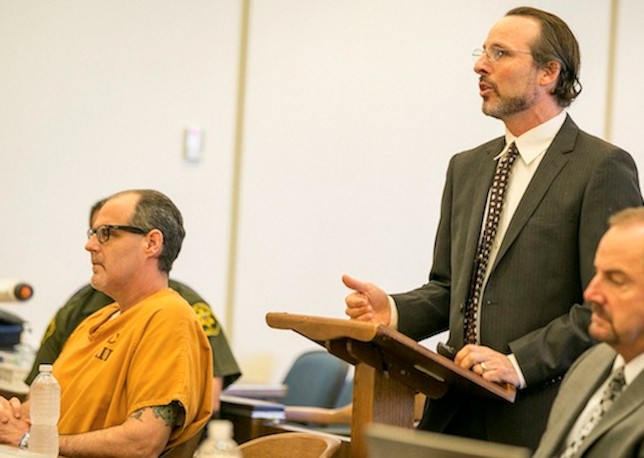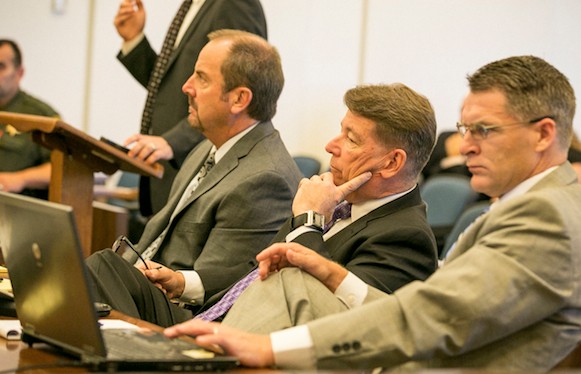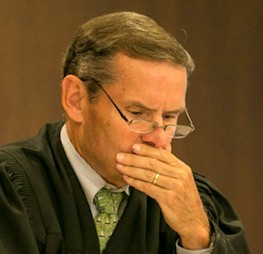
A month ago, a three-justice panel at the California Court of Appeal based in Santa Ana observed that jail deputies at the Orange County Sheriff’s Department (OCSD) “engaged in abhorrent conduct and were derelict in their duties.”
The panel–composed of justices Kathleen O’Leary, William Rylaarsdam and Richard Fybel–noted the “extreme nature of [the deputies’] conduct” didn’t just “violate the public trust and the spirit of what we expect from those entrusted to enforce the law,” but was also unmatched in state legal annals.
That documented OCSD jail deputy corruption included destroying evidence; committing perjury; doctoring logs; unnecessarily firing weapons at inmates sitting on toilets; ignoring medical emergencies; bolstering the power of incarcerated organized-crime bosses; encouraging inmate-on-inmate violence; and spending work hours running private businesses, sleeping, surfing the Internet, watching TV or texting love interests.
However, the panel declared in a 120-page, July 7 opinion involving the 2006 jailhouse murder of inmate John Derek Chamberlain that OCSD corruption did not amount to an “outrageous government conduct” finding, which would dismiss murder convictions for inmates who participated in beating Chamberlain to death and who claim deputies encouraged the crime by falsely branding the victim a child molester.
That appellate decision is this weekend weighing on the mind of Superior Court Judge Thomas M. Goethals, who is set to issue an Aug. 4 ruling about whether prosecutors in the Orange County district attorney’s office (OCDA) and local law enforcement, including OCSD deputies, cheated in hopes of securing the death penalty for Scott Dekraai, the shooter in the 2011 Seal Beach salon massacre — and, if so, what penalties should be imposed.
Goethals last week told Assistant Public Defender Scott Sanders, Dekraai’s legal counsel, that the appellate ruling sets a high bar for issuing “outrageous government conduct” findings that benefit a defendant.
But unlike the defense in the Chamberlain case, Sanders isn’t seeking dismissal of charges. He readily admits his client is guilty, but he believes extensive OCDA and OCSD cheating requires Goethals to protect the integrity of the criminal-justice system by imposing stiff penalties against the offending government actors. Sanders wants the judge to recuse Tony Rackauckas’ DA office, ban the death penalty as a punishment option and grant a 400-year-plus prison sentence without the possibility for parole.
Given the Seal Beach massacre is the deadliest crime in county history, it’s unlikely Goethals will remove the death penalty as an option for a future jury. And there’s probably considerable pressure on him to not recuse the DA’s office, whose members began labeling the judge biased when he agreed to let Sanders question law enforcement under oath. But the judge cannot confine his reprimand to the easiest possible course: merely lambasting prosecutors with tough words in a document that will start to collect dust at DA headquarters the day following its issuance.
After months of testimony and the release of thousands of pages of once improperly hidden documents, Goethals knows without doubt:
–Jail deputies working with prosecutors repeatedly violated Dekraai’s constitutional rights by employing a Mexican Mafia hoodlum to entice the defendant into talking about the crime and potential defense-trial strategies, a no-brainer no-no once a suspect has been charged and has a lawyer.
–Jail deputies and prosecutors worked to shield their unethical acts from disclosure by losing records, purposely not creating important records or cleverly crafting records in language that masked reality.
–Prosecutors, in violation of legal obligations, strenuously fought to hide records from Sanders and other defense lawyers in multiple cases.
–Prosecutors ignored a court order against them seizing Dekraai’s psychiatric records, wrote a misleading search warrant on the topic and saw a detective question the defendant without permission from his legal counsel.
–Deputies lied about their manipulations of jailhouse informants to aid the government’s cases.
–Prosecutors, while under oath, claimed memory losses on details that would aid Sanders, yet allegedly maintained crystal-clear recollections of details they thought bolstered their assertions of innocence.
–Prosecutors, once the depth of Sanders’ work proved embarrassing, conducted a sham internal investigation into all his allegations of misconduct but failed to take a single, meaningful note of their alleged findings.

Goethals also can’t be happy with the brazenly dishonest attempt by OCSD and OCDA to blame their misdeeds on Judge Terri Flynn-Peister. They claimed that when Flynn-Peister worked as an Assistant United States Attorney in the Department of Justice’s Santa Ana office, she ordered key, potentially exculpatory Orange County Jail records withheld from defense lawyers such as Sanders.
Flynn-Peister testified she never hid records, a claim supported by the fact that, unlike OCDA, the judge didn’t play discovery games with defense lawyers in her related federal prosecutions.
Incredibly, Deputy District Attorney Howard Gundy, who has represented his office in the special evidentiary hearing with Sanders, repeatedly implied that Flynn-Peister wasn’t telling the truth, even though he has no supporting records and his witnesses, particularly OCSD Deputy Seth Tunstall, have offered contradictory testimony under oath about the point and would have us believe their memories of events improved with the passage of time.
(Those miraculous, suddenly recalled law-enforcement memories, by the way, coincided with prosecutors’ ever-searching hunt for scapegoats in hopes of evading Sanders’ eagle-eye pursuit.)
Apparently realizing the strength of Flynn-Peister’s testimony during her second trip to the witness stand, Gundy abandoned his earlier attack on the judge to imply that unnamed FBI agents working at the federal prosecutor’s direction might have ordered Tunstall to hide records from defense lawyers.
To clear up that allegation, Goethals asked Flynn-Peister directly if she’d ever ordered anyone to hide documents.
“No,” she replied without hesitation.
All of this takes us back to the issue that demands legitimate penalization by Goethals: not just the government’s cheating, but also officials’ stark refusal to accept responsibility, even during the July 31 closing arguments in the Dekraai case. The stance clearly baffled the judge, who asked Gundy if he thought the evidence “shows prosecutorial misconduct.”
Gundy hedged his answer, noting that misconduct could range from simple “negligence to [malice],” and then reluctantly said, “I absolutely believe there have been prosecution errors.”
Goethals asked Gundy if he’d admit that government agents placed a jailhouse informant next to Dekraai to illegally win incriminating statements. No, said the prosecutor, eliciting moans in the audience. The placement of OCSD’s prized, veteran informant–the two-faced Fernando Perez of Mexican Mafia hoodlum fame–next to Dekraai was “a coincidence,” he claims despite overwhelming evidence otherwise.
According to Gundy, the key consideration about withholding exculpatory evidence from the defense is not whether the motive is evil, but rather whether Dekraai’s defense was harmed by the discovery violations.
“We only care about the end result,” he declared before labeling the judge’s questioning of prosecution moves against Dekraai unfair “Monday-morning quarterbacking.”
Goethals fired back, “That’s what judges do. . . . Your office failed to turn over easily turned over [documents to the defense].”

But to show just how far Gundy and his colleagues have gone in their circle-the-wagons mentality, consider the prosecutors’ response to Goethals’ request to explain all the suspicious oddities of DA actions.
After first angrily denying any problems existed, OCDA ran through a number of excuses–a lack of understanding of discovery obligations, a lack of understanding about when they can’t question a suspect who has a lawyer, a rogue federal prosecutor’s secret orders–Gundy arrived at one last lame attempted rationale: OC prosecutors were too busy to meet their ethical obligations.
Goethals offered a smile that wasn’t exactly friendly.
“‘I’m too busy’ is a valid excuse?” he asked.
Gundy quickly moved on.
“We are treating Mr. Dekraai in a very even-handed manner,” he stated. “There is no outrageous government misconduct here. . . . It’s an innocent sort of error that’s occurring here.”
Finally, Gundy couldn’t resist petty payback to the person he laughably claims is the real villain in the courtroom: Sanders, who, in truth, deserves a medal for extraordinary public service.
Dripping with odd sarcasm given the circumstances, the prosecutor said, “I understand what defense attorneys do–slant facts.”
I’ve covered the OCDA homicide unit for nearly two decades, appreciate the enormous skills of its prosecutors and have written more positive news coverage of their court wins than any other active journalist in Southern California. I still stand by my reports. But it’s obvious there needs to be a wake-up call for at least some members of the unit.
When Goethals announces his ruling on Monday morning, he must not just make an accurate historical record that appropriately criticizes offending law-enforcement agents with tough words. He also has to do the right thing. At a minimum, he has to punish the actual, unrepentant cheaters with the recusal they’ve sadly earned.

CNN-featured investigative reporter R. Scott Moxley has won Journalist of the Year honors at the Los Angeles Press Club; been named Distinguished Journalist of the Year by the LA Society of Professional Journalists; obtained one of the last exclusive prison interviews with Charles Manson disciple Susan Atkins; won inclusion in Jeffrey Toobin’s The Best American Crime Reporting for his coverage of a white supremacist’s senseless murder of a beloved Vietnamese refugee; launched multi-year probes that resulted in the FBI arrests and convictions of the top three ranking members of the Orange County Sheriff’s Department; and gained praise from New York Times Magazine writers for his “herculean job” exposing entrenched Southern California law enforcement corruption.

